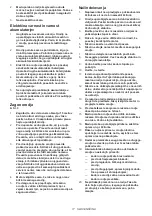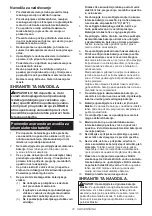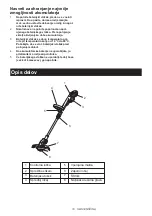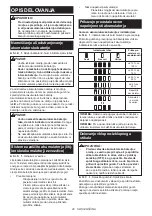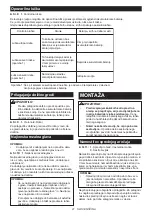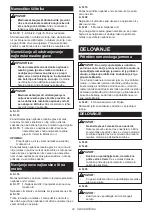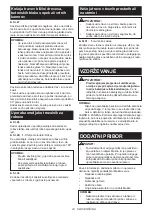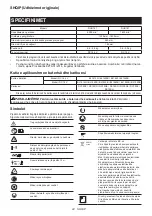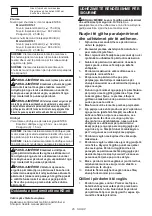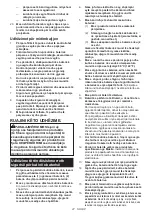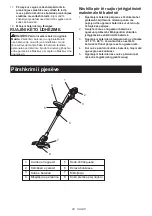
14 ENGLISH
Cutting the grass near a tree,
concrete block, brick or garden
stone
►
Fig.27
Hold the trimmer tilting at a level so that it does not
contact the ground surface and cut the grass using the
Nylon cord tip like knocking the ground. In this work,
smooth feeding out is needed because the Nylon cord
wears more quickly than usual.
NOTE:
•
Getting the trimmer too close to a tree, concrete
block, brick or garden stone or the like during
performing the edging work or such similar cut-
ting work may cause the Nylon cord to be cut off
halfway inside the spool cover. At this time, take
the spool out of the spool cover and then set
the Nylon cord again properly by referring to the
section titled "Installing or removing the Nylon
cutting head" and "Winding a new Nylon cord on
the spool". Using the tip of the Nylon cord during
operation brings the best result of operation and
therefore it is recommended to keep the tool
more than 5 cm away from the tree, concrete
block, brick or garden stone or the like.
Start the trimmer before getting close to the grass to
be cut.
Cut the grass using the Nylon cord tip by moving the
trimmer from right to left and proceed slowly, keeping
the trimmer tilted at the angle of about 30° in relation to
the ground surface.
When cutting high grass, cut in layers always beginning
from the top with each cut length short.
Using the tool as an edger
►
Fig.28
Using the tool as an edger allows the operator to cut
along the edge of the concrete block, brick and the like.
►
Fig.29:
1.
Motor housing
2.
Grip
For using the tool as an edger, hold the shaft of the
trimmer with one hand and turn the grip counter clock-
wise to loosen the shaft. Rotate the shaft with the motor
housing 180° and tighten the grip clockwise until it
locks.
NOTE:
•
Before rotating the shaft, it needs to be fully
shortened or extended.
•
After changing to the edger position, make sure
that the motor housing and shaft are locked.
►
Fig.30
To obtain a good result of finish cutting, move parallel to
the edge you are going to perform an edging work.
Cutting the grass in a tight place or
on a slope
WARNING:
•
When cutting the grass on a slope, be careful of
stones, grass and other foreign objects thrown
from the cutting head area.
•
When cutting the grass on a slope, make sure
that you always keep a good and stable footing.
►
Fig.31:
1.
Lock button
To ease the work in a tight place which restricts the
height, such as cutting the grass under an outdoor
wood deck and similars, push the lock button and then
bend down the cutting head so that the shaft is parallel
to the ground surface. Adjusting the cutting head angle
properly in this way helps you cut the grass on a slope.
MAINTENANCE
WARNING:
•
Always be sure that the tool is switched
off and battery cartridge is removed before
attempting to perform inspection or main
-
tenance on the tool.
Failure to switch off and
remove the battery cartridge may result in seri
-
ous personal injury from accidental start-up.
NOTICE:
Never use gasoline, benzine, thinner, alcohol or
the like. Discoloration, deformation or cracks may
result.
To maintain product SAFETY and RELIABILITY, repairs,
any other maintenance or adjustment should be per
-
formed by Makita Authorized Service Centers, always
using Makita replacement parts.
OPTIONAL ACCESSORIES
CAUTION:
•
These accessories or attachments are recom-
mended for use with your Makita tool specified
in this manual. The use of any other accessories
or attachments might present a risk of injury to
persons. Only use accessory or attachment for
its stated purpose.
If you need any assistance for more details regarding
these accessories, ask your local Makita Service Center.
•
Nylon cutting head
•
Nylon cords
•
Shoulder strap
• Goggles
•
Makita genuine battery and charger
NOTE:
•
Some items in the list may be included in the
tool package as standard accessories. They
may differ from country to country.
Summary of Contents for DUR181
Page 2: ...1 2 3 1 1 2 1 2 1 Fig 1 Fig 2 Fig 3 Fig 4 Fig 5 Fig 6 Fig 7 Fig 8 2 ...
Page 3: ...1 2 1 1 2 3 1 2 3 1 2 3 4 Fig 9 Fig 10 Fig 11 Fig 12 Fig 13 Fig 14 Fig 15 Fig 16 3 ...
Page 4: ...1 2 1 2 1 2 Fig 22 Fig 17 Fig 18 Fig 19 Fig 20 Fig 21 Fig 23 Fig 24 4 ...
Page 5: ...1 2 Fig 30 1 Fig 25 Fig 26 Fig 27 Fig 28 Fig 29 Fig 31 5 ...
Page 106: ...106 ...
Page 107: ...107 ...

















